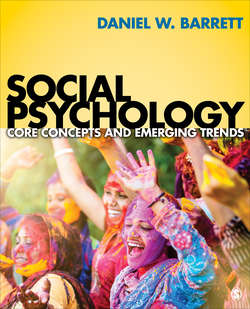Читать книгу Social Psychology - Daniel W. Barrett - Страница 165
На сайте Литреса книга снята с продажи.
Social Comparison: Looking Up and Looking Down
ОглавлениеAn important postulate of SEM is that people manage their social comparisons in order to maintain a positive self-image (Strickhouser & Zell, 2015; Tesser, 2003). We decide who to compare ourselves to based on whether or not the comparison will enhance our self-worth. When people engage in downward social comparison, they contrast their own performance, ability, or situation with individuals who did less well, have weaker abilities, or are in worse situations (Johnson & Knobloch-Westerwick, 2014; Ross & Bowen, 2010). Say you drive a rusty 1988 Volkswagen with numerous dings, scratches, dents, and malfunctioning controls, and occasionally think “I drive such a crappy, ugly car.” But then you may remember that your best friend has no car at all, and as a result, you feel a bit better (Buunk & Oldersma, 2001). Even cancer patients may contrast the severity of their disease with that of others who are worse off as a way of feeling better about their own situation (Wood, Taylor, & Lichtman, 1985). Another self-enhancing comparison people often make is with their former selves, typically believing that they have improved over the years (Kanten & Teigen, 2008).
In contrast to downward comparison, you may instead engage in upward social comparison, in which you evaluate your performance, ability, or situation with a superior person’s (Crusius & Mussweiler, 2012; Tesser, 1988). Perhaps you look at the “A” a classmate received on an exam and compare it to your “B.” Or maybe you notice how an acquaintance keeps beating you at Wii tennis. Using these comparisons to motivate yourself to work hard and perform better would be a beneficial result of upward comparison (Blanton, Buunk, Gibbons, & Kuyper, 1999). In this case, your motive is neither accurate self-evaluation nor self-enhancement but rather self-improvement. In contrast, a negative result of such upward comparison occurs when you allow the comparison to demoralize you by focusing your thoughts on what you haven’t achieved (Dunn, Ruedy, & Schweitzer, 2012). Both upward and downward social comparisons are most useful when you compare yourself to people who are similar to you on relevant characteristics (Tiggemann & Polivy, 2010). For instance, you may be better off contrasting your cycling prowess with your brother’s rather than Lance Armstrong’s.
A related tactic people can use to improve their self-esteem is to engage in counterfactual thinking or imagining what could have happened (Medvec, Madey, & Gilovich, 1995; Petrocelli, Percy, Sherman, & Tormala, 2011). Victoria Medvec and her colleagues studied silver and bronze medalists’ reactions to their event placements in the 1992 Summer Olympic games and the 1994 Empire State Games. Who do you think would feel better after completing an important competition, the bronze medal winners who placed third or silver medal winners who placed second? Using videotapes of the award ceremonies and interviews with winners, they found that bronze medalists were more satisfied with their medals than were silver medalists, despite the fact that silver medalists had obviously performed better than their counterparts. Why? Well, bronze medalists primarily focused on the counterfactual that they almost received no medal at all (almost came in fourth), and that increased their satisfaction with their achievement. In contrast, silver medalists thought more about a different alternative outcome—that they almost won the gold medal—and as result were more disappointed (Medvec et al., 1995).
Self-Protection: Efforts intended to maintain or defend one’s positive self-image
Self-Promotion: Efforts designed to enhance one’s self-image
Downward Social Comparison: Contrasting one’s own performance, ability, or situation with individuals who did less well, have weaker abilities, or are in worse situations
Upward Social Comparison: Contrasting one’s performance, ability, or situation with individuals who performed better, have stronger abilities, or are in better situations
Counterfactual Thinking: Imagining what could have happened (but did not)
